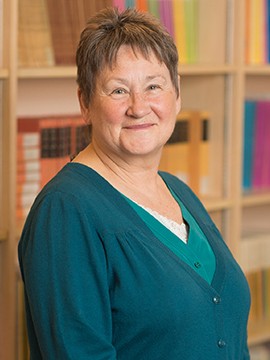An interest in social justice drives Professor Dawn Currie’s work.


As an academic, it’s taken her to Vietnam, where for the past decade she’s been involved with a project to advance gender equity.
As a feminist scholar, that same interest sparked her latest study, which examines the processes shaping young girls’ sense of who they are.
Currie, who teaches in the Deptartment of Sociology, specializes in teaching aspiring sociologists their core research methods as well as the essentials of feminist theory.
“I make the starting assumption that students in sociology are curious about the social world,” she says.
Her own curiosity has — in turn — been fueled by interactions with her students. She says her day-to-day contact with young women exposed her to the issues they face and developed her interest in studying girlhood.
Currie’s most recent book, Girl Talk: Adolescent Magazines and Their Readers (University of Toronto Press: 1999), explores how girls interpret the messages in women’s magazines.
Her current study examines the avenues through which adolescent girls are able to forge new, non-conventional girlhoods. Currie, along with colleague Deirdre Kelly (UBC Faculty of Education) and Shauna Polmerantz (UBC PhD Educational Studies ‘06) are in the final stages of a book on the topic.
This project looks at girls who throw the competition for popularity out the window and reject the notion of trying to dress a certain way and win approval from boys.
Currie and her co-researchers are interested in girls who take up non-conventional activities such as skateboarding, and even studies the games girls play online, looking at the personas they take on in virtual worlds where they can escape the expectations of their everyday peer culture.
On a global level, along with her colleague Huguette Dagenais (Laval University), Currie is mentoring researchers in Vietnam. One study explored what happens when young people, especially girls, migrate from the countryside into the city to find work.
“The group would identify a development issue that they want to work on and then we would tutor them through the different stages of designing a research project,” says Currie, explaining her mentorship role.
She began teaching at UBC in 1988, after earning her PhD at the London School of Economics and working briefly at two other universities.
“Knowledge, especially of something social like gender relations, has to be very specific to the time, the place, and the culture,” she adds.
For this reason, the goal was to assist the Vietnamese investigators through the process of creating their own research, rather than importing the knowledge of gender of others. The same impetus lies behind teaching students in the classroom to conduct research and theorize for themselves, she explains. “Research is the best way to make knowledge relevant,” Currie says.
“The most rewarding thing about teaching, regardless of a student’s final grade, is seeing a student who has real curiosity work through the process of figuring out how to do good inquiry.”


